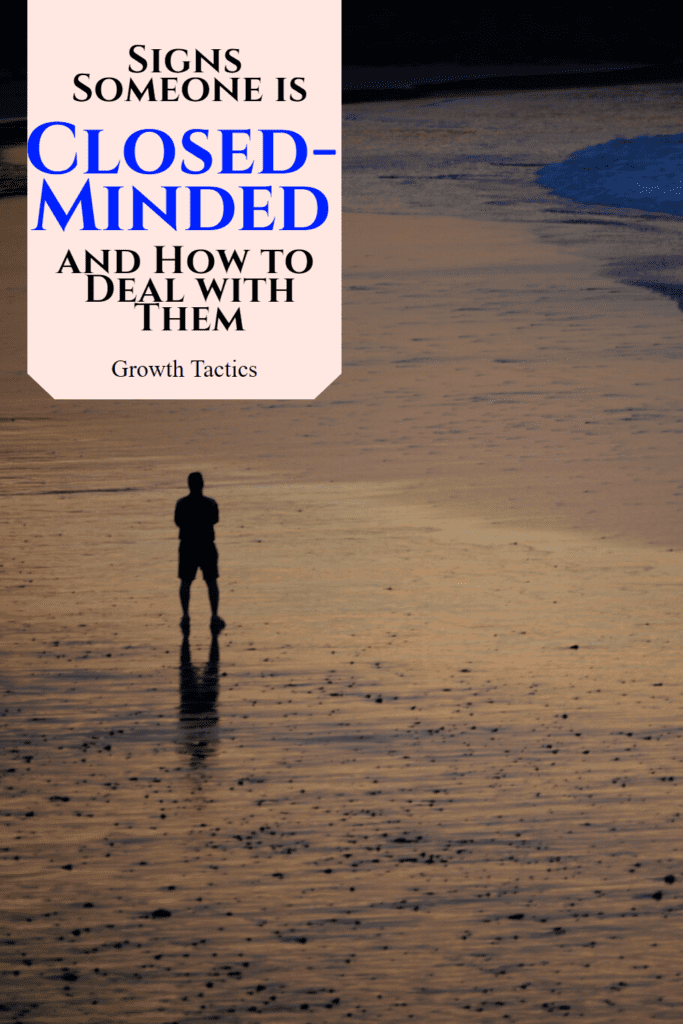Have you ever come across someone who just seems to have a closed mind? You know, those people who refuse to consider other perspectives and are set in their ways? It can be challenging to interact with closed-minded individuals, but fear not! In this article, I’ll share with you some signs to look out for and provide you with the best ways to deal with them. So let’s dive in and discover how to navigate closed-mindedness with grace and tact!
Jump To Section
Signs of Closed-Mindedness
Recognizing closed-mindedness in others can help you better understand their mindset and adjust your approach accordingly. Here are a few signs to watch out for:
1. Resistance to New Ideas
Closed-minded individuals tend to dismiss new ideas or opinions without giving them a fair chance. They might respond with phrases like, “We’ve always done it this way” or “That will never work.” It’s like their minds have a “Do Not Enter” sign when it comes to fresh perspectives.
2. Unwillingness to Consider Alternatives
People with closed minds often cling tightly to their beliefs and opinions, refusing to entertain any alternative viewpoints. They may become defensive or even hostile when faced with opposing ideas, shutting down any possibility of a constructive conversation.
3. Lack of Open-Minded Questions
Closed-minded individuals tend to ask closed-ended questions or ones that only validate their existing beliefs. They may not genuinely seek out different perspectives or be open to challenging their own assumptions.
4. Lack of Curiosity
Closed-minded individuals often lack a genuine curiosity about the world around them. They are not open to exploring new ideas, perspectives, or experiences. Instead, they prefer to stay within their comfort zone and avoid anything that challenges their existing beliefs. This lack of curiosity narrows their mind and inhibits personal and intellectual growth.
5. Dismissal of Expert Opinion
Closed-mindedness often leads individuals to dismiss expert opinions or established knowledge. They may brush off the insights of subject matter experts, claiming bias or conspiracy. This dismissal prevents them from considering valuable evidence and expertise.
6. Fear of Change
Fear of change is a common characteristic of closed-minded individuals. They tend to cling tightly to the familiar, resisting new ideas or innovative approaches. Embracing change can be difficult for them, hindering personal growth and adaptability.
7. Inflexibility in Communication
Closed-minded individuals often display rigidity in communication, making it challenging to engage in meaningful dialogue. They might dominate conversations, interrupt others, or fail to actively listen. This inflexibility prevents the open exchange of ideas and inhibits productive conversations.
8. Binary Thinking
Closed-mindedness often manifests in binary thinking, viewing the world in simplistic black-and-white terms. They see issues as right or wrong, good or bad, without acknowledging shades of gray or alternative perspectives. This rigid mindset limits their openness to new ideas.
9. Selective Acceptance of Information
Closed-minded individuals tend to cherry-pick information that aligns with their preconceived notions while disregarding conflicting evidence. They selectively accept data or sources that support their beliefs, reinforcing their closed-mindedness and avoiding intellectual challenge.
10. Resistance to Self-Reflection
Closed-mindedness can lead to resistance towards self-reflection. Individuals may avoid questioning their own beliefs, assumptions, or actions, fearing it may uncover uncomfortable truths or challenge their worldview. This resistance limits personal growth and inhibits open-mindedness.
How to Deal with Closed-Mindedness
Dealing with closed-minded people can be tricky, but with the right strategies, you can navigate these interactions more effectively. Here’s what to do:
1. Approach with Empathy
Remember, closed-mindedness often stems from fear, insecurity, or a desire to maintain control. Begin by empathizing with their perspective and acknowledging their feelings. Putting yourself in their shoes can help foster a more productive conversation.
2. Encourage Open-Mindedness
Gently encourage the person to explore new ideas and consider different viewpoints. Pose thought-provoking questions that prompt reflection rather than direct confrontation. By encouraging open-mindedness, you create an environment where they feel safer to challenge their own beliefs.
3. Share Personal Experiences or Stories
Tap into the power of storytelling to illustrate how open-mindedness has positively impacted your own life. By sharing personal experiences, you can help them realize that being open to new ideas can lead to growth, learning, and expanded perspectives.
4. Appeal to Logic and Evidence
Closed-minded people tend to rely on emotions and opinions rather than reason and evidence. When discussing a topic, present logical arguments and supporting evidence that challenge their existing beliefs. Backing up your points with solid facts can help to open their minds by showing them alternative perspectives based on reality.
5. Know When to Move On
Sometimes, despite your best efforts, closed-minded individuals may refuse to budge. It’s essential to recognize when it’s time to disengage and focus your energy on more fruitful conversations. Not everyone is ready or willing to embrace open-mindedness, and that’s okay. Preserve your own mental and emotional well-being by knowing when to let go.
Benefits of Open-Mindedness
Open-mindedness isn’t just about being receptive to new ideas and perspectives; it brings about a whole range of advantages that can positively impact both our personal and professional lives. So, let’s dive in and explore the benefits of open-mindedness together!
Expanded Perspective:
-
Open-mindedness broadens our horizons and helps us see the world from different angles. It allows us to step outside our own experiences and understanding, opening us up to new possibilities and ideas.
-
By embracing diverse perspectives, we gain a deeper understanding of the people and cultures around us. This helps us develop empathy and fosters stronger relationships with those from different backgrounds.
-
Innovation and Creativity:
-
When we have an open mind, we become more receptive to innovative ideas and solutions. By being willing to explore different approaches, we invite creativity to flow freely and generate fresh and exciting outcomes.
-
Open-mindedness encourages us to challenge the status quo and think outside the box. This mindset often leads to groundbreaking discoveries, advancements, and inventions across various fields.
-
Personal Growth:
-
Open-mindedness paves the way for personal growth and development. By being open to feedback and constructive criticism, we can continually learn, improve, and refine our skills.
-
It allows us to embrace change and adapt to new circumstances more effectively. By letting go of rigid beliefs and preconceived notions, we become more resilient and responsive to the ever-evolving world.
-
Enhanced Problem-Solving Skills:
-
Having an open mind enables us to approach problem-solving with flexibility and adaptability. Instead of getting stuck in fixed perspectives, we explore innovative alternatives and consider multiple sides of an issue.
-
By incorporating diverse viewpoints, we can make better-informed decisions and find creative solutions that might not have been apparent initially.
-
Improved Relationships:
-
Open-mindedness plays a crucial role in building and nurturing relationships. When we are receptive to different opinions and ideas, we create an environment of respect and inclusion.
-
It encourages effective communication and collaboration, allowing for the free exchange of thoughts and perspectives. This, in turn, strengthens our connections with others and fosters a sense of unity and belonging.
-
Incorporating open-mindedness into our lives brings a multitude of benefits, helping us grow as individuals, professionals, and community members. By remaining receptive to new ideas and perspectives, we open ourselves up to a world of opportunities, creativity, and personal growth. So, let’s embrace open-mindedness and unlock the incredible advantages it has to offer!
Are There Any Benefits to a Closed Mind?
Well, my friend, let’s take a moment to ponder whether there are any silver linings to closed-mindedness. After all, it’s essential to consider different perspectives and explore the full spectrum of ideas, even when discussing closed-mindedness.
Now, it’s crucial to note that closed-mindedness, by its nature, limits our ability to grow, learn, and flourish. However, there can be a few situations where closed-mindedness might have some perceived benefits, although they aren’t necessarily long-lasting or conducive to personal development. Here are a couple of instances:
Maintaining Certainty:
-
Closed-mindedness can provide a sense of certainty and security. By steadfastly holding onto fixed beliefs, some individuals may find comfort in resisting change or challenging ideas.
-
This certainty can offer stability in a world that’s constantly evolving, allowing them to navigate familiar territories without the need to question their viewpoints.
-
Expediency:
-
Closed-mindedness can be efficient in certain situations where quick decision-making is necessary. By swiftly sticking to preconceived notions or familiar ways of thinking, individuals may avoid the time and effort required to consider alternative ideas.
-
However, it’s important to remember that this efficiency may come at the cost of missing out on valuable insights and creative solutions.
-
While these limited benefits are worth acknowledging, it’s crucial to recognize the bigger picture. Closed-mindedness imposes significant restrictions on personal growth, innovation, and the development of meaningful relationships. Embracing open-mindedness allows us to embrace diversity, discover new perspectives, and reach our full potential.
Embrace Open-Mindedness
In a world that benefits from open discourse and diverse perspectives, cultivating open-mindedness is crucial. We must be willing to challenge and expand our own beliefs and encourage others to do the same. Remember, being open-minded doesn’t mean we have to abandon our core values; it simply means we approach new ideas with curiosity and a willingness to grow.
So the next time you encounter someone with a closed mind, take a deep breath, employ these strategies, and engage in a respectful conversation. Who knows, you may just inspire a positive shift towards open-mindedness. After all, we all tend to learn and grow more when we keep an open mind and acknowledge that we may be wrong.


